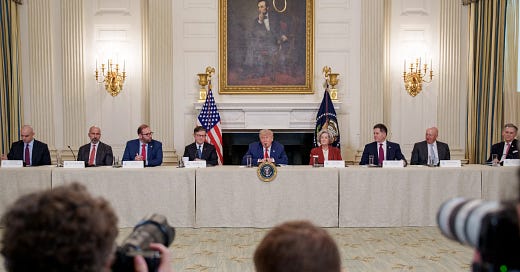The “Trump Accounts” initiative, announced on June 9, 2025, promises every newborn American a $1,000 investment account to kickstart their financial future. As a fiscal conservative, I’m skeptical. Here’s a quick look at how it works, what it costs, and why it raises red flags.
Trump Accounts, which will be seeded with a one-time government contribution of $1,000 and be private property of the child’s guardian, will track a stock index and allow for additional private contributions of up to $5,000 per year. This will afford a generation of children the chance to experience the miracle of compounded growth and set them on a course for prosperity from the very beginning.
How It Works
What: Every U.S. newborn gets a $1,000 account, funded by the government, invested in a stock market index.
Contributions: Families can add up to $5,000/year, tax-deferred, like a 401(k).
Goal: Build wealth for kids’ future (education, homes, businesses).
Backers: Trump, Speaker Mike Johnson, and CEOs like Michael Dell pitch it as a capitalist way to boost opportunity.
The Cost
Yearly: $1,000 × 3.6 million births = $3.6 billion.
20 Years: $72 billion, plus millions for administration.
Hidden Costs: Tax-deferred contributions cut federal revenue, adding to the $33 trillion national debt.
Americans already have multiple tax-advantaged savings vehicles: 529 education savings plans, Coverdell ESAs, Roth IRAs, and regular investment accounts. Parents who prioritize their children’s financial future can already set aside money in tax-efficient ways. The real barriers to building wealth aren’t a lack of government seed money—they’re financial literacy, stable employment, and disposable income.
Consider this: if parents can’t afford to contribute the additional $5,000 annually that these accounts allow, how meaningful is that initial $1,000 really going to be after inflation and decades of minimal growth?
True fiscal conservatives should be deeply uncomfortable with this proposal for several reasons:
It’s not the government’s job to be America’s financial advisor. We’ve spent decades arguing that individuals and families make better financial decisions than bureaucrats. Why are we now saying the federal government needs to force savings on newborns?
It creates new bureaucracy. These accounts will require administration, oversight, and regulatory frameworks. That means more federal employees, more compliance costs, and more opportunities for government overreach.
It’s poorly targeted. Wealthy families who would contribute the full $5,000 annually don’t need government help building wealth. Meanwhile, struggling families who can’t afford additional contributions get minimal benefit from the program. This is classic middle-class welfare disguised as universal policy.
It sets a dangerous precedent. If the government can justify spending billions on investment accounts for babies, what stops the next administration from expanding the program or creating similar “starter” accounts for other purposes?
Rather than creating a new entitlement program, fiscal conservatives should focus on policies that actually promote wealth building without expanding government:
Simplify existing tax-advantaged accounts and increase contribution limits for families
Eliminate capital gains taxes for long-term investments under a certain threshold
Expand access to financial education through private-sector partnerships
Reduce regulatory barriers that prevent low-income Americans from accessing investment opportunities
These approaches achieve the same goals—encouraging savings and investment—without adding to the federal deficit or creating new government programs.
Trump Accounts might poll well and generate enthusiastic CEO endorsements, but they represent exactly the kind of big-government spending that fiscal conservatives have historically opposed. The fact that it comes wrapped in free-market rhetoric doesn’t change the fundamental reality: this is a multi-billion-dollar expansion of federal spending during a time of historic debt.
If we truly believe in the power of free markets and compound interest, we should trust American families to make these decisions themselves. The last thing our children need is another government program—especially one they’ll eventually have to pay for through higher taxes or increased debt.
Sometimes the most conservative position is simply saying “no” to new spending, even when it’s politically popular. Trump Accounts may be good politics, but they’re questionable policy for anyone serious about fiscal responsibility.
What are your thoughts on the proposed “Trump Accounts?” Leave us your thoughts in the comments.
Support Our Mission
Conservative Ladies of America is a 501(c)(4) nonprofit organization dedicated to advocating for conservative values, influencing policy, and empowering grassroots action. Your donations and subscriptions help us create impactful content, educate citizens, and drive real change across the nation.
While contributions are not tax-deductible, every dollar goes directly toward protecting our freedoms and amplifying your voice.
👉 Join the movement—Donate or Subscribe Today.
Thank you for standing with us.







I am a TRUMPSTER. However, I agree with you …this is more enabling on the backs of future non taxpayers…more debt, more entitlement…less effective society…down the chute we go!
I agree with you.
There's so much that could be done instead. For example, start indexing capital gains for inflation. It's outrageous that those who hold stocks or mutual funds long term to keep independent then have to pay taxes on the inflation effects of any gains whenever they cash out.
Regarding the savings for babies, it would make more sense to come up with ways to keep Social Security going, such as raising the age when it can be accessed.
And the fact that the Medicaid expansion enabled by Obamacare results in lazy people getting more funding than the poor that the program was meant to help is sickening.